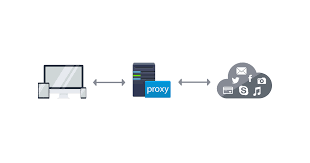Proxy in modern conditions

Why websites restrict access to data
In today’s constantly growing and constantly evolving world, we are getting more and more sites, services, and services that allow Internet users to receive all kinds of data and content. As they say, “servers are not rubber”, and the more popular the resource, the more load these same servers have to “digest”. And if we add “parasitic” traffic to all this, then we get a huge load that is difficult to predict and maintain. To do this, popular resources usually resort to «soft limits».
It is worth saying that the limits are usually divided into soft and hard. Soft limits are such limits that seem to hint to the user of the resource that he is wrong and it is not worth doing this anymore. Such limits can also be applied in cases where the web server or resource that is being visited is subject to a DDoS attack or increased load.
Unfortunately, limits have become commonplace on the modern Internet. This means that with a high probability, the popular site that you so enjoy visiting has already taken care of scenarios such as web attacks for a long time. Sometimes such restrictions interfere with the normal use of the site by ordinary visitors. But, owners have to choose between a completely non-working site and painful restrictions and restrictions.
Growing demand for data and limits from owners
But if there is a demand for content, then there will be a demand for getting more of this content. Each new restriction, in one way or another, causes demand to close the past need for content and data. For example, if the site made it possible to make 100 requests per day and get geolocation data based on a request indicating an IPv4 address. But, suddenly, this same site added a captcha from Google (it can be reCAPTCHA of any version) or captcha. And now the legitimate user of the site, the question arises, how to use the site now. How to bypass google captcha. There are requests like “google captcha how to remove”, “how to bypass captcha”, etc.

We talked about the captcha itself and why a captcha is needed earlier.
Site speed limitations
Of course, it is no longer a secret that proxies allow you to bypass limits and restrictions of this kind. This is especially effective for rotating proxies since their IPs do not “stagnate” like static proxies. And for more than one year, there has been a struggle between proxies and sites. With a lot of resources and time, site owners invest in the fight against proxies, as this primarily increases the load on the servers. The cost of data processing, although falling every day, for site owners, even with 100 thousand visitors, increasing the load by 20%, for example, can result in an additional $ 10 thousand.
Consequences and depreciation of proxies due to limits
The basis of the liquidity of proxies is their quality and the ability to get to the right resource without any problems and pull out the necessary data. There is a lot to be said for quality. But it is difficult to argue that if the proxy does not respond to requests, then there is no point in talking about any other characteristics. Therefore, it is always important that the proxies work. Even if proxies are blocked on a particular site, it should always be possible to use them on another resource.
In our realities, we are faced with different limits. And when these restrictions affect a whole huge segment of traffic, then the processes associated with compensating access to these most limited parts of the world’s content begin.
If for a multi-million country, we block access to a popular resource such as Instagram or Facebook, then we will get the demand for IPv4 or IPv6 proxies for working with these sites just from the blocked regions. For example, blocking Instagram for a whole country will lead to a huge demand for free VPNs, free proxies, and the ability to continue working with these resources. The topic has already been raised with what is the difference between VPN and Proxy, so we will not pay much attention to this topic.

Demand rises, price rises
Limits only create an increased demand for bypassing these limits with a proxy or VPN. But if a VPN is more about comfortable work and constant stable access to data from one GEO. Those proxies allow us to receive huge amounts of data at the same time. Everything is limited only by the available proxy powers and the limits of these same proxies.
Since the IPv4 pool has long been exhausted, each new Internet user “takes over” an IP address. Each online webcam takes an IP address from a common pool of addresses. Any device that has access to the Internet (and now even coffee makers and vacuum cleaners) reduces the pool of addresses that are available for use. Just like with cryptocurrencies, the number of IPv4 addresses is limited. Initially, no one could have thought that the number of devices that will have access to the Internet will be so colossal.
Accordingly, there is not enough for everyone. And if we say About requests to bypass restrictions using a proxy, the value is growing almost every month.
Soon, the only thing that can save the situation is the transition to IPv6. But as practice shows, no one is not interested in this. For those site owners who have invested in optimization and protection, it is not profitable to switch to IPv6, as they will lose a competitive advantage over those who could not or did not want to work on protecting their site. Telecom operators successfully sell IPv4 addresses for several dollars per month. It is already a whole market, the turnover of which is estimated at several million dollars a month. And why should the economy lose this market?